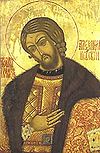- Maximilian Steinberg
-
Maximilian Osseyevich Steinberg (Russian Максимилиан Осеевич Штейнберг; July 4, 1883 [O.S. 22 June] – December 6, 1946) was a Russian composer of classical music born in what is now Lithuania.
Contents
Life
Steinberg was born into a Jewish family in Vilnius. His father, Osey (Hosea) Steinberg, was a leading Hebraist. In 1901 he went to Saint Petersburg, to study biology at Saint Petersburg University. He graduated in 1906. In the meantime he also started studying at the Saint Petersburg Conservatory. He entered Anatoly Lyadov's harmony class, moving on to Nikolai Rimsky-Korsakov's harmony class and Alexander Glazunov's counterpoint class. His considerable talent in composition soon showed, encouraged especially by his mentor Rimsky-Korsakov. He graduated from the Conservatory in 1908. Fellow student Igor Stravinsky felt disgruntled at the apparent favor of Steinberg by Rimsky-Korsakov over him.[1] Nevertheless, Steinberg named Stravinsky one of his closest friends when the latter had made a big name in the West, a move Stravinsky strongly resented.
In 1908 Steinberg married Rimsky-Korsakov's daughter Nadezhda. Rimsky-Korsakov died the same year, and Steinberg edited and completed Rimsky-Korsakov's monumental treatise, Principles of Orchestration, later published in Paris. Steinberg became first a lecturer, then in 1915 Professor of Composition and Orchestration, at the Conservatory, a post his father-in-law had held. He held numerous other posts at the Conservatory; among other things, he was, from 1934 to 1939 a deputy director, before he went into retirement in 1946. Steinberg played an important role in Soviet music life as a teacher of composers such as Dmitri Shostakovich, Galina Ustvolskaya and Yuri Shaporin. He died in 1946 in Leningrad.
Musical style
Steinberg was considered first as a great hope of Russian music, and was occasionally even more highly estimated than his student colleague, Igor Stravinsky. He rejected Stravinsky's and other modern styles, usually preferring the style of his teachers and showing the influence of the nationalistic Mighty Handful as well. His composing technique is handled with firm control and brilliant orchestration - these features have been noticed most often about his compositions.
Many of his works use world literature for their subjects. The dictates of socialist realism as they affected music starting in 1932 meant no great changes for him, since his style already was mostly in conformity with what was requested. He tended to select the topics of his programmatic works more often now on national topics, and let himself be influenced more often by musical and literary folklore. As a composer, Steinberg is today little known; it did not help that even at the time he was considered eclectic. More importance is attached to him now as a teacher.
His first two symphonies have been recorded by Neeme Järvi for the company Deutsche Grammophon.
Partial list of works
- For orchestra
- Symphony No. 1 in D major, Op. 3 (1905/06)
- Symphony No. 2 in B-flat minor, Op. 8 "In memoriam Nikolai Rimsky-Korsakov" (1909)
- Symphony No. 3, Op. 18 (1928)
- Symphony No. 4 "Turksib" (1933)
- Symphony No. 5 "Symphonic Rhapsody on Uzbek Themes" (1942)
- Variations for Large Orchestra in G major, Op. 2 (1905)
- Symphonic Prelude "in memoriam Nikolai Rimsky-Korsakov", Op. 7 (1908)
- Fantaisie dramatique, Op.9 (1910)
- Solemn Overture on Revolutionary Songs from 1905-7 and 1917 (1930)
- In Armenia, Capriccio (1940)
- "Forward!", heroic Uzbek Overture (1943)
- Violin concerto (1946)
- Stage works
- Metamorphosen, Ballet after Ovid, Op. 10 (1913)
- Till Eulenspiegel, Ballet (1936)
- Incidental music
- Vocal music
- "The Water Nymph", Cantata for Soprano, Women's Chorus and Orchestra, Op. 7 (1907)
- "Heaven and Earth" for Voice and Orchestra after Byron (1918)
- Four Songs with Orchestra after Rabindranath Tagore, Op. 14 (1924)
- Songs
- Choruses
- Chamber music
- String Quartet No. 1 in A, Op.5 (1907)
- String Quartet No. 2, Op. 16 (1925)
The eleventh of Nikolai Myaskovsky's symphonies (Op. 34, in B flat minor) is dedicated to Steinberg. (See Myaskovsky's opus list[2] which also contains a transcription, dated 1930, by the slightly older composer of Steinberg's third symphony for piano four-hands.)
Notes
References
- Taruskin, Richard (2000). Defining Russia Musically: Historical and Hermeneutical Essays. Princeton University Press. pp. 455–457. ISBN 0691070652.
- Steinberg opus list from van Rijen's site
External links
Further reading
- Walsh, Stephen. Stravinsky: A Creative Spring: Russia and France, 1882-1934. New York: A. A. Knopf, 1999. ISBN 0-679-41484-3. Contains many details about the course of the relationship between Stravinsky and Steinberg.
- Principles of Orchestration at Project Gutenberg (by Nikolay Rimsky-Korsakov, edited by Maximilian Steinberg and translated into English by Edward Agate).
People from Russia Leaders and religious - Pre-1168
- 1168–1917
- 1922–1991
- 1991–present
- RSFSR leaders
- General secretaries
- Soviet premiers (1st deputies)
- Soviet heads of state (and their spouses)
- Prime ministers (1st deputies)
- Foreign ministers
- Prosecutors general
- Metropolitans and patriarchs
- Saints

Military and explorers - Field marshals
- Soviet marshals
- Admirals
- Aviators
- Cosmonauts
Scientists and inventors - Aerospace engineers
- Astronomers and astrophysicists
- Biologists
- Chemists
- Earth scientists
- Electrical engineers
- IT developers
- Linguists and philologists
- Mathematicians
- Naval engineers
- Physicians and psychologists
- Physicists
- Weaponry makers
Artists and writers Sportspeople - Chess players
Categories:- 1883 births
- 1946 deaths
- Russian composers
- Russian music educators
- For orchestra
Wikimedia Foundation. 2010.
